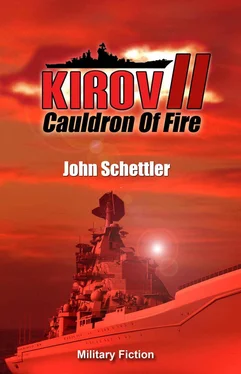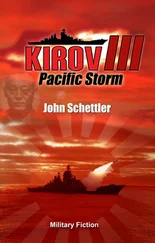He looked at them, a weariness in his eyes. “Now for the rest of your bad news. What does Byko say?”
“Flooding below the waterline near the propulsion shafts.” Fedorov was blunt and to the point. “He wants us to reduce revolutions so he can get men inside near the shafts, and put out divers to seal the leak on the hull again. It must have been splinter and concussion damage from those near misses. It aggravated the initial damage there when the helicopter was jettisoned.”
“Can we make these repairs safely?”
“We have been running at thirty knots since midnight. In that time we fought our battle and moved well west. We are now ninety nautical miles from the Straits of Gibraltar. Force Z is sixty nautical miles southeast of our present position, and making fifteen knots in a slow circle. They are gathering all their remaining ships and covering the carriers. Even if they turned to try and engage us again, that gives us at least three hours for Byko to get men in the water and effect repairs before we would have to move again…Unless they release their cruisers and destroyers to pursue us.”
“If they head in our direction we can discourage them at long range if need be,” said Karpov. “Remember, our deck guns can range out to 50,000 meters if need be with radar guided round tracking. That long range ammunition is very limited, but we have a couple hundred rounds in the magazines.”
“Very well,” said Volsky. “Tell Byko to get started.”
“His men should be in the water in ten minutes, sir.”
“And what does our helicopter report? We must have received telemetry by now.”
Karpov looked at Fedorov, clearly uneasy. Then the young Captain spoke up, his manner somewhat discouraged, and almost apologetic. He had been surprised by the Italian battleships earlier, but this was an even harder blow.
“I’m afraid we have more trouble ahead than we do behind us. Our KA-40 had a good look west of Gibraltar and reports another large British fleet at sea off Lagos, Portugal, and moving south at about twenty-five knots.”
“I would like to think that is just another convoy heading for Gibraltar,” said Volsky, “but not at that speed.”
“True, sir.” Fedorov was looking at his shoes, clearly bothered.
“Then this is a battle fleet?”
“We spotted four capital ships in a long battle line, a carrier, at least four cruisers and a handful of destroyers. It can only be Home Fleet, sir. How they could have learned of us and moved south so quickly is amazing.”
“But they did,” said Volsky, his eyes dark with concern. “So now it is our turn to be astounded by the sudden appearance of an unexpected enemy at sea. Lagos… How far away are they?”
“Some 200 miles, sir. If they keep to their present course and speed they would arrive at the western approaches to the straits in another eight hours, right around 16:00.”
“We are ninety miles from Gibraltar now. Yes? Then let me do some mathematics. If we give Byko two hours, and can then run again at thirty knots for three more, it will take us five hours to reach the eastern approaches to these straits. That is a slim margin to slip through. I imagine we may have minefields to contend with?”
“Very likely, sir.”
“We used the UDAV-2 missile system to blast our way through at Bonifacio,” Karpov put in quickly.
“Yes, and that was very clever, Captain, but how long did it take you to transit the strait?”
“Two hours,” said Fedorov.
“Two, plus three, plus two makes seven. If this British Fleet hurries they can probably trim another hour’s sailing time from their run as well. Gentlemen, the numbers do not add up very favorably.” The admiral was not happy.
“Our choices are clear,” said Karpov. “We must now decide whether to forego these repairs Byko wishes to make, and run for the straits at once, or to wait and risk another major battle if we are late.”
“You say four capital ships, Fedorov?”
“Yes, sir. Probably all four King George V class battleships. We fought the first two earlier in the Atlantic and, though we damaged them, it took three hits to force Prince of Wales to drop out of their battle line, and all from our best missile, the Moskit-IIs.”
“Yes, I have been listening to them launch all night. I lost count. How many are left?”
“Nine, sir.”
“And another nine Mos-IIIs, with eight more P-900 cruise missiles,” said Karpov. “It is enough, sir. I can get us through.”
“Who is commanding this British fleet?” The Admiral looked to Fedorov now.
“We cannot know for certain, sir, but my best estimate would be the fleet commander himself, Admiral John Tovey.”
“What kind of man is he?”
“Experienced, highly disciplined, an excellent military planner, well respected by his peers and all who serve under him. He can be a single minded and determined foe, sir. His pursuit of the Bismarck was typical of his style at sea.”
“This is the same man we encountered earlier?”
“Yes, sir. After the Captain struck him at range, he fell off, linked up with additional forces, called for the support of Force H, and then continued his pursuit.”
“You fought this man, Mister Karpov. What is your military opinion?”
“He was determined, that much is clear. But outmatched, sir. Kirov can do the job, I assure you.”
“Oh? Then why did you have to resort to tactical nuclear weapons?”
Karpov was silent. “I have answered this, Admiral. In my mind I saw no reason why the ship should not use the full measure of our real power.”
“Yet I have spoken with the other officers on the bridge that day, and they tell me the tactical situation was not favorable. We were confronted by four separate task forces, and to engage them all would have most likely depleted our entire missile inventory.”
“Which is why I elected to let one missile do the work of many.”
“Yes, we noticed,” said Zolkin.
“I am well aware of your opinion in the matter, Doctor,” Karpov said sharply.
“There is no need to go over all that again,” said Volsky. “What was done, was done. Karpov knows what he did, and why. He has asked to serve and redeem himself, and he has done that.”
Karpov raised his chin, sniffing. “Thank you, Admiral. While I believe I can win the battle with our conventional weapons, it is also my duty to state that we still have our nuclear option should it become necessary.”
“I am well aware of that, Mister Karpov, but this consideration is a cold logic. It asks me to trade the ammunition we save for the lives of hundreds, perhaps thousands of men. Believe me, I do not relish that thought. What I wish to know now is how this Admiral Tovey will fight us if it comes to that?”
“He will be a tenacious and dangerous opponent in battle sir. If you want my opinion he will not like his tactical situation at dusk this evening , and may wish to wait and fight his battle tomorrow. We will be arriving near sunset, and his ships will all be starkly silhouetted by the sun.”
“That makes no difference,” said Volsky. “We can see them as easily at midnight.”
“Yes, sir, but he does not know that. Remember that he will think tactically like a man of his era. If our striking power was as limited in range as his own, I do not think he would hesitate to close and engage. As it is, however, I believe he will have learned from his experience in the North Atlantic. He will think we fight more like an aircraft carrier than a battleship. He knows we are capable of scouting his forces out and striking at very long ranges, and this is, in fact, our great advantage. The key to battling a strong enemy carrier has always been air power, but our tremendous SAM defense has neutralized this option. Every time they throw an air strike at us it gets cut to pieces. If he uses his planes again, it will simply be to harass us, or distract us.”
Читать дальше












